- Home
- Joan Lowery Nixon
Nobody's There
Nobody's There Read online
Praise for
Nobody’s There
“An engaging suspense story with diverse characters, plenty of plot twists, and a satisfying ending.” —Booklist
Books by Joan Lowery Nixon
FICTION
A Candidate for Murder
The Dark and Deadly Pool
Don’t Scream
The Ghosts of Now
Ghost Town: Seven Ghostly Stories
The Haunting
In the Face of Danger
The Island of Dangerous Dreams
The Kidnapping of Christina Lattimore
Laugh Till You Cry
Murdered, My Sweet
The Name of the Game Was Murder
Nightmare
Nobody’s There
The Other Side of Dark
Playing for Keeps
Search for the Shadowman
Secret, Silent Screams
Shadowmaker
The Specter
Spirit Seeker
The Stalker
The Trap
The Weekend Was Murder!
Whispers from the Dead
Who Are You?
NONFICTION
The Making of a Writer
This is a work of fiction. Names, characters, places, and incidents either are the product of the author’s imagination or are used fictitiously. Any resemblance to actual persons, living or dead, events, or locales is entirely coincidental.
Text copyright © 2000 by Joan Lowery Nixon
Cover photographs © Corbis Images/PictureQuest (top); © Stockbyte/SuperStock (bottom)
All rights reserved. Published in the United States by Delacorte Press, an imprint of Random House Children’s Books, a division of Random House, Inc., New York. Originally published in hardcover by Delacorte Press, New York, in 2000.
Delacorte Press is a registered trademark and the colophon is a trademark of Random House, Inc.
Visit us on the Web! randomhouse.com/teens
Educators and librarians, for a variety of teaching tools, visit us at RHTeachersLibrarians.com
Library of Congress Cataloging-in-Publication Data is available upon request.
ISBN 978-0-385-32567-7 (trade) — eISBN: 978-0-307-82343-4 (ebook)
Random House Children’s Books supports the First Amendment and celebrates the right to read.
v3.1
Contents
Cover
Other Books by This Author
Title Page
Copyright
Chapter One
Chapter Two
Chapter Three
Chapter Four
Chapter Five
Chapter Six
Chapter Seven
Chapter Eight
Chapter Nine
Chapter Ten
Chapter Eleven
Chapter Twelve
Chapter Thirteen
Chapter Fourteen
Chapter Fifteen
Chapter Sixteen
Chapter Seventeen
About the Author
Trembling, her legs so wobbly it was hard to stand, Abbie Thompson clung to the rough trunk of an oak tree and waited for her father to appear. As a garish yellow porch light over the nearest apartment suddenly gleamed, Abbie sucked in her breath and slid farther back into the darkness behind the wide tree trunk.
Abbie knew she shouldn’t be here. She shouldn’t be spying. She’d die if her father saw her. Fearing to be seen, she had pulled a scarf over her strawberry-blond hair, which was light enough to stand out in the darkness. She must not be caught lurking, but she had to know. She had to!
The door of the apartment opened, and Davis Thompson stepped out, hand in hand with a young, very pretty, dark-haired woman. Both of them tall, trim, and attractive, they moved as though they knew they were an exceptionally good-looking pair. Laughing, they drew close to each other, and he bent to kiss her.
It was a light, quick kiss, but Abbie doubled over in pain. It felt as if someone had socked her hard in the stomach.
She watched her father and the woman run to his low-slung red sports car. Before she could react, before she could think, the car had driven away.
Abbie let herself slide to the ground, sitting cross-legged in the dark. She stared at the still-bright front window of the apartment, hating the woman who lived there and hating her father.
All through the seventeen years of her life, Davis Thompson had called Abbie “Daddy’s girl,” and she had loved this special nickname. He had been a real daddy then. He’d played ball with her and gone to her Fathers’ Night dinners at school and applauded her piano playing at recitals. Lately, though, he had become so different that Abbie wondered if he could possibly be the same person.
Davis Thompson—known to nearly everyone in the south Gulf Coast town of Buckler, Texas, as Dr. Davis Thompson, professor of English at Buckler College—suddenly dyed his hair to cover the gray at his temples, wore expensive sports coats over cashmere turtleneck sweaters, bought a car that would fit a movie star’s lifestyle, and walked out on his family.
“You must understand, Sandra, I’m not being fulfilled any longer,” her father had told Abbie’s mother just before he left. “Life should be rich and complete.”
“Davis, are you serious?” Mrs. Thompson’s voice had wavered with shock.
He raised his voice as if he were arguing not only with her, but with himself. “I’ve given this sincere and weighty consideration,” he said. “For a long time I’ve felt that my life here is nothing.”
Frozen in the hallway, Abbie couldn’t help overhearing the conversation. She had gasped and leaned against the wall for support. Mom and Davy and she were nothing?
“Is there someone else?” Abbie’s mother had asked. Her voice came out raspy and choked, and she had to ask the question again.
“Be reasonable,” Dr. Thompson had said. “It wasn’t working with us. You know that.”
“No, I didn’t know. I thought … well … your moodiness … I mean, when you didn’t get the promotion to department head, I assumed …”
“Perhaps I would have got it, if I’d had more support from you,” Dr. Thompson had snapped.
“More support?” Mrs. Thompson’s voice had risen. “After all I’ve done—”
But the back door had slammed shut. Realizing that her father had left, Abbie had run to cling to her mom.
Now Abbie dug her fingers into the circle of freshly turned earth that surrounded the tree. As her hands slid over the ring of small, smooth stones that bordered the circle, she whispered to her absent father over and over, “How could you not want us? How could you?”
She tried to look away from the lighted apartment window. Behind the golden glow lived the woman with the dark hair, the woman who had kissed her father.
The pain in Abbie’s mind and body turned to an anger hot and intense. Breathing heavily, she unconsciously gripped the stones, pulling them from their ring as she rose to her feet. She stepped out from under the wide limbs of the oak, aimed at the window, and threw the stones as hard as she could.
“I hate you! I hate you!” she yelled.
The glass smashed, gold-red splinters flying to each side like starbursts. There was a moment of total silence, as though the air had stopped moving. Then a young woman in a robe, her blond hair wet and stringy, ran screaming from the apartment. Doors of other apartments opened, and people scurried out, scrambling without direction like ants whose hill has been disturbed. A beefy man in his undershirt grabbed Abbie’s arms. A plump woman kept yelling that she had called the police.
Abbie stood numbly, the red anger draining from her mind and body, as she tried to remember what she had done.
Like an automaton Abbie moved through the
next few hours. She was driven in a police car to the station, where someone asked her a million questions, then fingerprinted and photographed her.
Her mother appeared, tear streaks on her face. “Oh, Abbie! Oh, darling, I’ll help you. This is all your stupid, stupid father’s fault.”
Dr. Thompson arrived, scowling. “What a foolish thing to do, Abbie! What could you have been thinking? You can thank me for talking Jamie and her roommate out of pressing charges.”
But local officials had recently waged war on malicious mischief. Getting tough on these troublemaking kids was a priority, and Abbie found herself sitting in an office opposite a man who introduced himself as Judge Arnold Wilhite.
The judge reminded Abbie of her late grandfather Bill, with his thin hair combed over his bald spot, and crinkle lines around his eyes. Judge Wilhite leaned back in his office chair and rested his tooled cowboy boots on his desk. “I want to hear what you have to say, Abigail. Why’d you throw rocks through Miss—” He stopped and glanced at the paper on his desk. “—through the window of Miss Jamie Lane’s apartment?”
So that was her name—Jamie Lane, Abbie thought. “I guess I don’t have a good reason,” she told the judge. She stared at her hands, which were clenched in her lap. “I just did it.” The numbness she had felt began to slide away, and Abbie was frightened. She breathed in small, shallow gasps, trying to steady herself.
Judge Wilhite studied Abbie for a few minutes. Then he said, “The D.A.’s office is talking about prosecuting you for malicious mischief. Is that what you’d call what you did? Malicious mischief?”
Abbie raised her head and looked at him. “It wasn’t mischief. It was hate. I hated her, and I was angry.”
“Had you given this act some thought? Had you planned to come to Miss Lane’s apartment and throw rocks?”
“No. I didn’t even think about it while I was throwing the rocks. It’s just that when my father kissed her …” Abbie stopped speaking and looked down at her hands again, surprised that her fingers looked like twisted spiders’ legs and her knuckles stood out like small white knobs.
“Do you regret what you’ve done?”
“No! I mean, I’m sorry I scared that woman’s roommate. I didn’t know she had a roommate. But I’m not going to apologize to my father or to … that woman.”
“Although you’re a first-time offender, the response to teenagers’ breaking the law is getting tougher and tougher.” The judge thought a moment, then asked, “Abbie, have you ever heard of deferred adjudication?”
She shook her head, and he answered, “Adjudication means my decision. Deferred means I can put off giving my decision.”
“I don’t understand,” Abbie replied. “Why should you put off making a decision?”
“Because of what might take place in the meantime.” With a thump Judge Wilhite’s boots landed on the floor, and he leaned forward, elbows on his desk. “You’re seventeen. Do you have a Texas driver’s license?”
“Yes,” Abbie said.
“Is there an automobile at your disposal?”
Abbie shrugged. “Mom has let me drive her car when I have to stay late at school for something and can’t take the school bus. When that happens she takes the city bus to the office where she works. She’s in the finance department for a real estate company and—”
The judge waved his hand, and Abbie stopped in midsentence. “Do you have an after-school job?” he asked.
“No.”
“Extracurricular activities that keep you busy?”
“Not very busy. I’m in the choral group, and I thought about maybe signing up for yearbook staff.” Abbie shivered. She didn’t know what the judge was trying to find out. Was she giving the wrong answers?
“Do you keep up your grades?”
Abbie ached as she stared into the judge’s dark and penetrating eyes. He could read her mind. She was sure he could. So why was he asking so many questions? She took a deep breath and answered, “My grades have always been good—until lately. Lately, I haven’t wanted to study. I haven’t cared.”
Do you know what it’s like to be considered a nothing—a nobody? she thought. Why should a nothing care about studying or grades or anything else?
Judge Wilhite bent over his desk, writing something. Abbie waited. Then he said, “I’m going to put you on probation for one year, Abigail. I’m going to give you a job to do, and you’re going to show me that you can do it well. At the end of the year, under the decree of deferred adjudication, all record of your arrest will be wiped out. You’ll have a clean slate. Got it?”
Abbie knew he was waiting for her to thank him. But she didn’t care if she had a clean slate. She didn’t care that he seemed to be doing her a huge favor. “What kind of a job?” she asked.
“The Buckler Women’s Club has recently set up a program to aid elderly women in the community,” he said. “It’s called Friend to Friend. Teenage volunteers are matched with older women who live alone. Each morning, at a set time, the girls telephone the women to make sure they’re okay. Most of these women can no longer drive and they have no family member at hand to drive for them, so the girls take on this job. Two or three days a week after school or on weekends they drive the women to the grocery store, or sometimes to a department store, or to the senior citizens’ center. Often, with their families, they take the women to church on Sundays.
“I think highly of this program,” Judge Wilhite added, “perhaps because my wife is president of Friend to Friend, and she tells me about the success stories they’ve had.”
Abbie stared at him. “You want me to take care of some old lady?”
“Not ‘some old lady.’ One particular elderly woman who needs assistance. You’ll soon know her by name and become acquainted with her.”
“I haven’t got time,” Abbie protested.
“Sure you have.”
Tears blurred Abbie’s vision. With the back of one hand she wiped them away. “I know what you’re doing,” she blurted out. “You’re trying to keep me so busy I can’t get into more trouble. For your information, I’m not going to throw rocks. I’m not going near that … that woman. I’m never going to see her or my father again.”
“That’s up to you,” the judge said quietly. “I had hoped you’d understand what I’m trying to do for you. I’m not going to explain it to you. I’ll let you figure it out yourself.”
As he stood and walked toward the door, Abbie realized he wanted her to leave. She stumbled to her feet and followed him.
“By noon tomorrow, you’ll receive the name of the woman with whom you’ll be paired. I want you to call on her. Visit her house, as soon as you’ve read the material in the packet. Got it?”
“Got it,” Abbie mumbled.
“Look at me, Abigail.”
Abbie raised her head and did as he had asked. She wished Judge Wilhite didn’t look so much like her grandfather. Her grandfather had been kind and full of laughter and fun. He wouldn’t have punished her by giving her a horrible job like this. But the judge had laugh lines around the corners of his mouth and eyes too. Maybe he liked to laugh. Maybe he had grandchildren. Tears burned her eyes again.
“I’m going to talk to your mother and father and to the attorneys out there. Please wait here with my secretary. It won’t be long before you and your mother will be free to leave and go home,” the judge said.
Abbie nodded. The words escaped before she could stop them. “Thank you,” she said.
Judge Wilhite smiled, and all the crinkle lines deepened. “Wait until one year from now,” he said. “Then I think you’ll really mean it.”
Later, as Abbie and her mother drove home, the sea air damp against their skin, they both cried a little.
“I guess I’ve been too concerned with my own problems. But I just can’t believe that your father would—” Mrs. Thompson broke off, took a long breath, and said, “It has to be my fault. I’ve let you down.”
“No, you haven’t, Mom. It’
s not your fault. It’s Dad’s. I hate him for leaving us, for not wanting us.”
Mrs. Thompson whirled to stare in surprise at Abbie. “Not wanting you?”
“Watch it, Mom! The light’s changing.”
The car rocked as Mrs. Thompson slammed her foot on the brake. “Listen to me, Abbie,” she said. “Your father wasn’t leaving you and Davy. He loves you both.”
“No, he doesn’t.”
“Yes, he does,” she answered, “as much as he can love anybody besides himself.”
Abbie sighed. “I don’t want to talk about Dad, Mom. I can’t take it. I don’t want to talk about anything.”
Mrs. Thompson reached over and patted Abbie’s arm. “All right, sweetheart. I understand.” She mumbled something under her breath, then glanced at the brightly lit numbers on the car’s clock. “At least we’ll be home before ten. Mrs. Erwin’s staying with Davy, and she lets him stay up later than he should.”
As they turned into their driveway, Abbie broke her silence. “Mom,” she said, “do I have to do what the judge told me? I mean about baby-sitting some old—uh—elderly woman?”
“I’m afraid so, Abbie,” her mother answered. “Your father said he couldn’t afford to help in getting you a secondhand car, which doesn’t surprise me. Just look at the expensive sports car he’s driving! So for a year you’ll use my car on certain days after school and on Saturdays, and I’ll catch the bus. That should make him happy. Well, never mind that he’s no help and doesn’t care. I care. I’m not going to let you be prosecuted for …”
Her voice broke, and it took a few moments before she could continue. She put on a light smile and the same aren’t-we-going-to-love-this tone she used with Davy every time she came up with some new healthful casserole. “The judge explained the Friend to Friend program, and it sounds okay. According to him, many of the girls and the women they’re assigned to have become close friends.”
Close friends? Abbie hated the idea. She already had close friends. She didn’t need new friends—especially women older than her own grandmothers.
But in the morning Judge Wilhite’s wife telephoned early. Abbie was munching through a bowl of cereal and staring blankly at the row of small, colorful cream pitchers that marched across the kitchen windowsill, when the phone rang and she reached for it. “Hello,” she said. Overbright sunlight blasted through the window, ricocheting off the polished wooden table, and the blare of Davy’s Saturday-morning cartoons made her head ache.

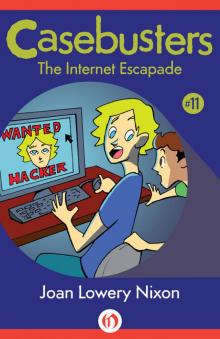 The Internet Escapade
The Internet Escapade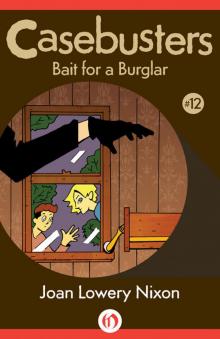 Bait for a Burglar
Bait for a Burglar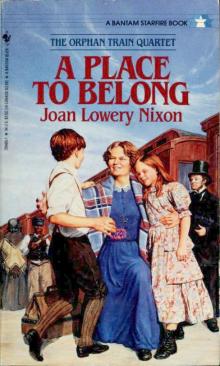 A Place to Belong
A Place to Belong Nightmare
Nightmare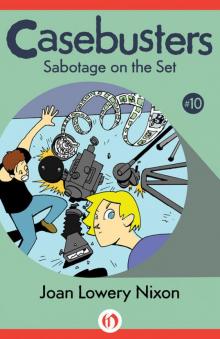 Sabotage on the Set
Sabotage on the Set The Other Side of Dark
The Other Side of Dark Whispers from the Dead
Whispers from the Dead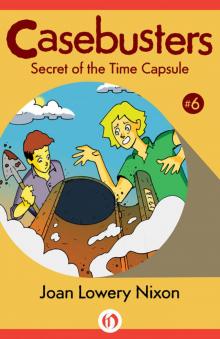 Secret of the Time Capsule
Secret of the Time Capsule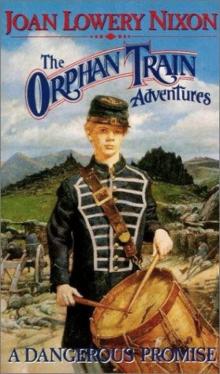 A Dangerous Promise
A Dangerous Promise Laugh Till You Cry
Laugh Till You Cry Spirit Seeker
Spirit Seeker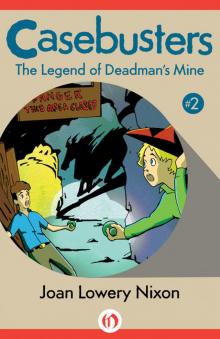 The Legend of Deadman's Mine
The Legend of Deadman's Mine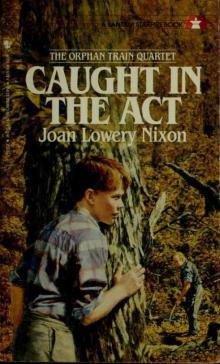 Caught in the Act
Caught in the Act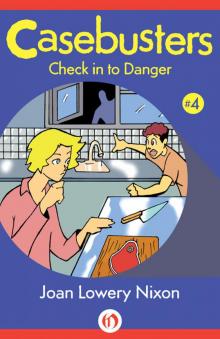 Check in to Danger
Check in to Danger Ellis Island: Three Novels
Ellis Island: Three Novels The Name of the Game Was Murder
The Name of the Game Was Murder The Haunting
The Haunting Lucy’s Wish
Lucy’s Wish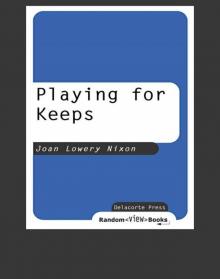 Playing for Keeps
Playing for Keeps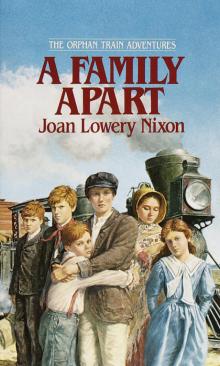 A Family Apart
A Family Apart Nobody's There
Nobody's There Shadowmaker
Shadowmaker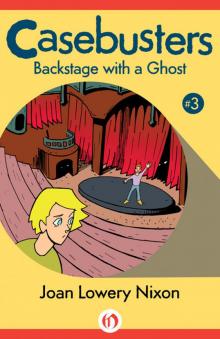 Backstage with a Ghost
Backstage with a Ghost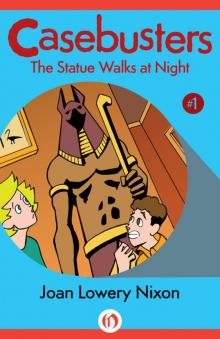 The Statue Walks at Night
The Statue Walks at Night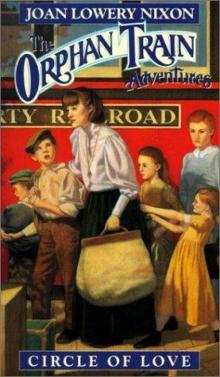 Circle of Love
Circle of Love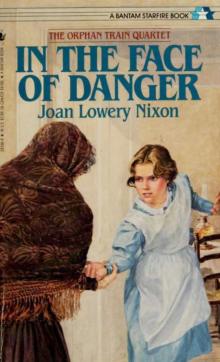 In the Face of Danger
In the Face of Danger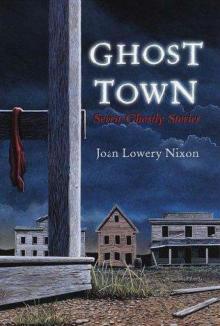 Ghost Town
Ghost Town A Candidate for Murder
A Candidate for Murder The Weekend Was Murder
The Weekend Was Murder The Island of Dangerous Dreams
The Island of Dangerous Dreams The Ghosts of Now
The Ghosts of Now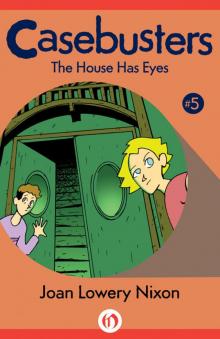 The House Has Eyes
The House Has Eyes The Dark and Deadly Pool
The Dark and Deadly Pool Keeping Secrets
Keeping Secrets Secret, Silent Screams
Secret, Silent Screams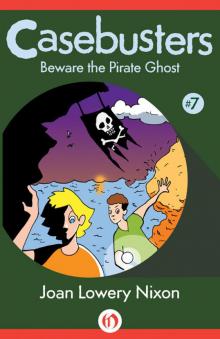 Beware the Pirate Ghost
Beware the Pirate Ghost Search for the Shadowman
Search for the Shadowman Haunted Island
Haunted Island